Abstract
BACKGROUND: Patients with chronic disease comply with about 50% of their treatment. The complex and time consuming daily drug regimens needed in the care of adult patients with cystic fibrosis encourage non-compliance with prescribed treatments. Understanding the reasons for, and the extent of, non-compliance is essential for a realistic appraisal of the patient's condition and sensible planning of future treatment programmes. METHODS: Patients were invited to complete a questionnaire which asked about their compliance with daily treatment. The data were used to calculate a compliance score, the percentage of prescribed treatment taken, and to examine patient attitudes to each individual prescription. An assessment score derived from consultant, cystic fibrosis research fellow, specialist nurse, and physiotherapist ratings of patient compliance was compared with the compliance score. Both scores were correlated with patient characteristics and disease severity, and the compliance score was also correlated with the patient's knowledge of cystic fibrosis. RESULTS: More than half the patients claimed to take more than 80% of their treatments. Compliance with individual treatments varied according to their perceived unpleasantness and degree of infringement on daily activities. The most common reason given for omitting treatment was forgetfulness. Professional carers were poor judges of patient compliance. There was no correlation between compliance and patients' sociodemographic characteristics or their knowledge about cystic fibrosis. CONCLUSIONS: Non-compliance is universal and should be recognised as normal behaviour. There are no reliable criteria for predicting any patient's level of compliance. Treatment protocols should be planned around individual patient's requirements, modifying treatment ideals where necessary according to the exigency and pattern of that patient's lifestyle.
Full text
PDF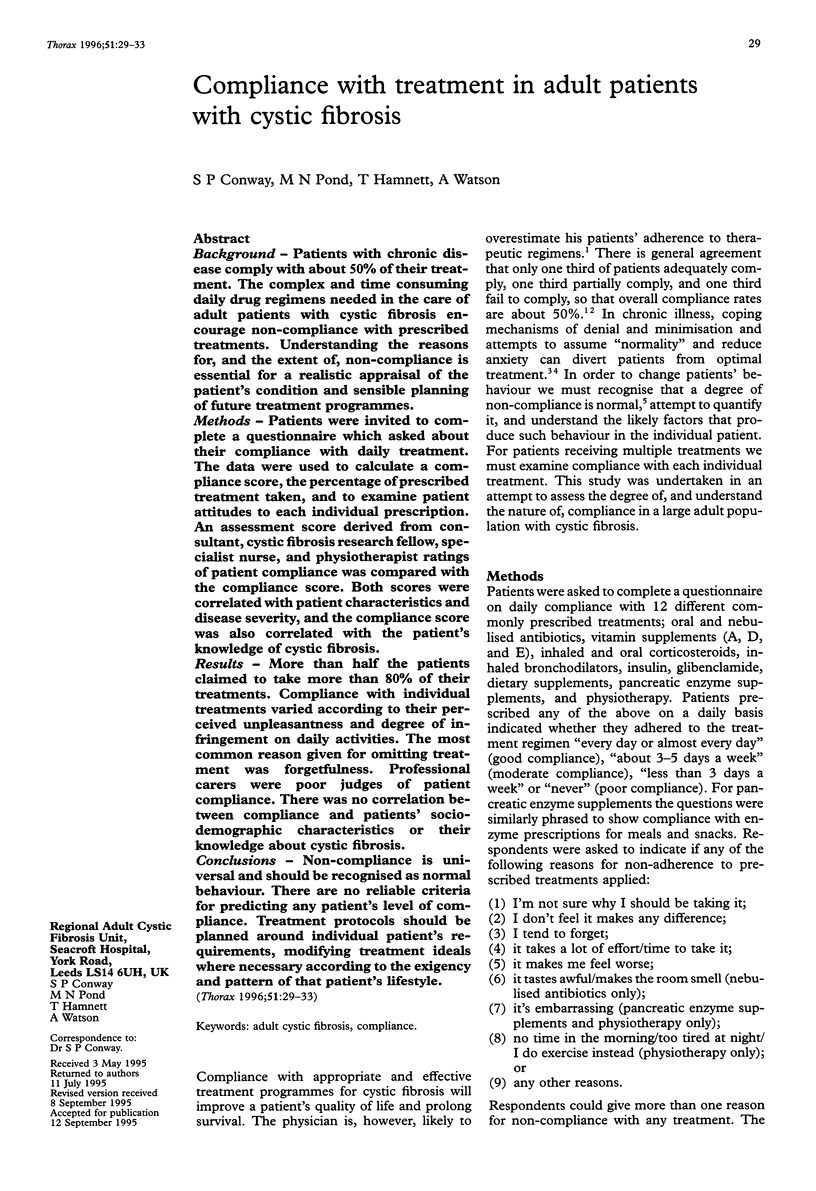
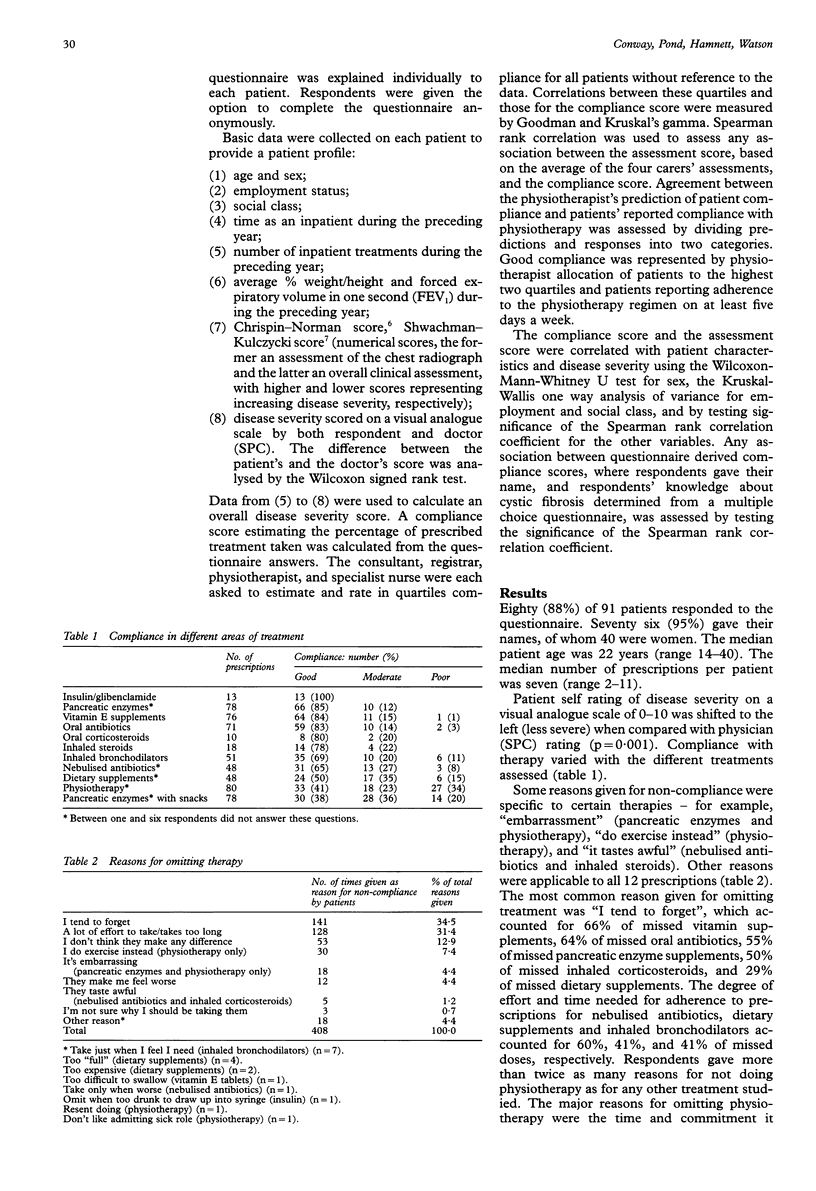
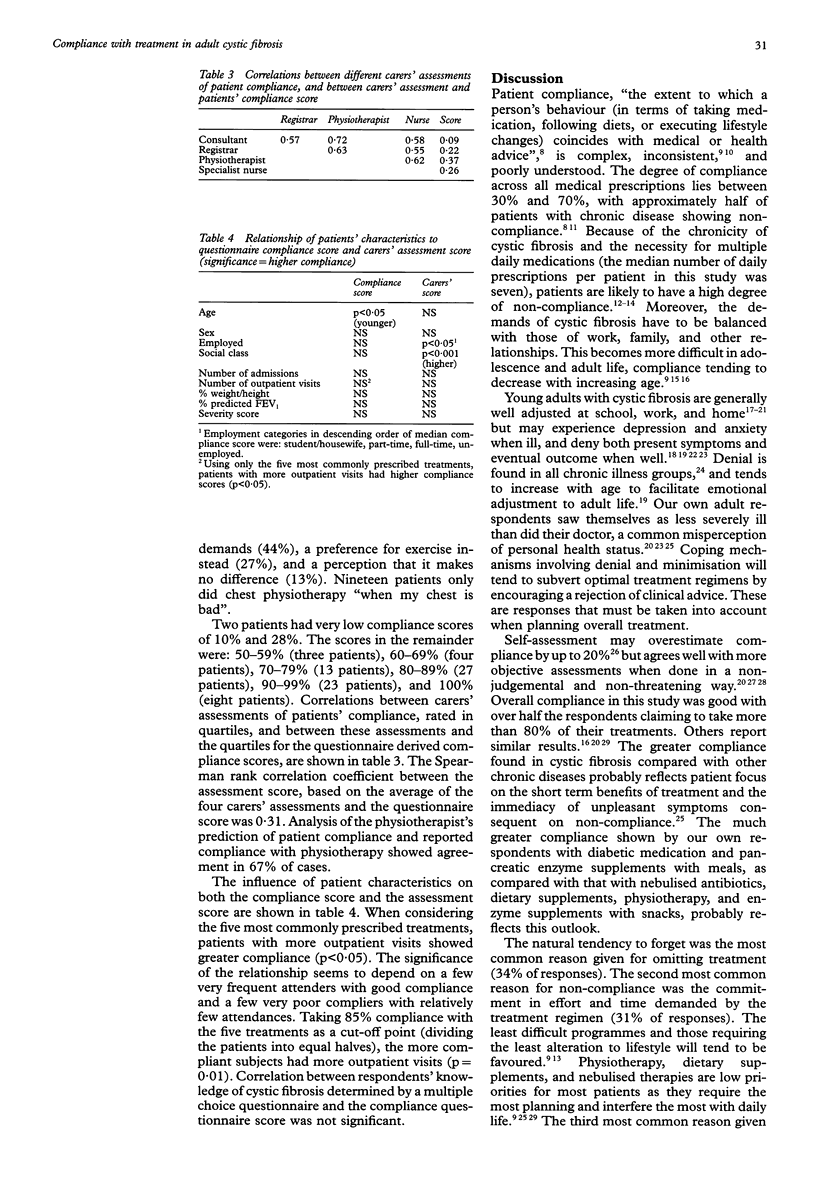
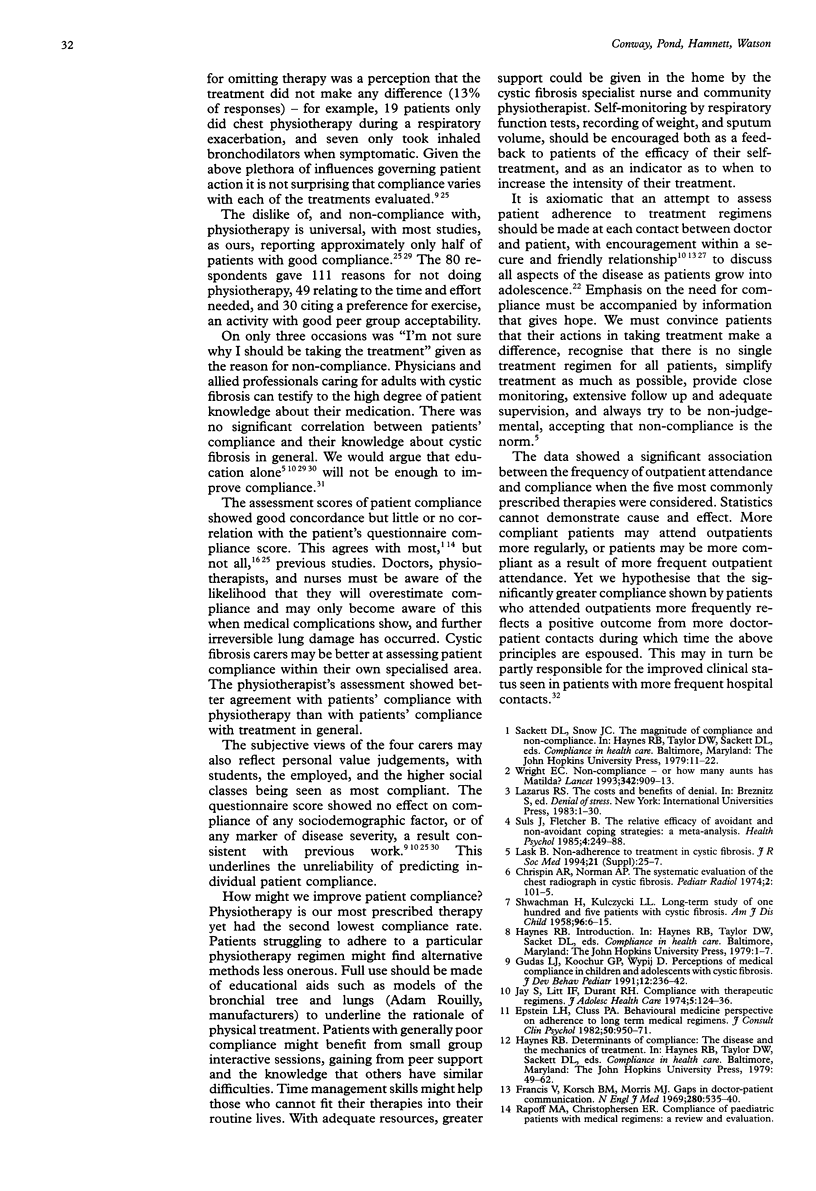
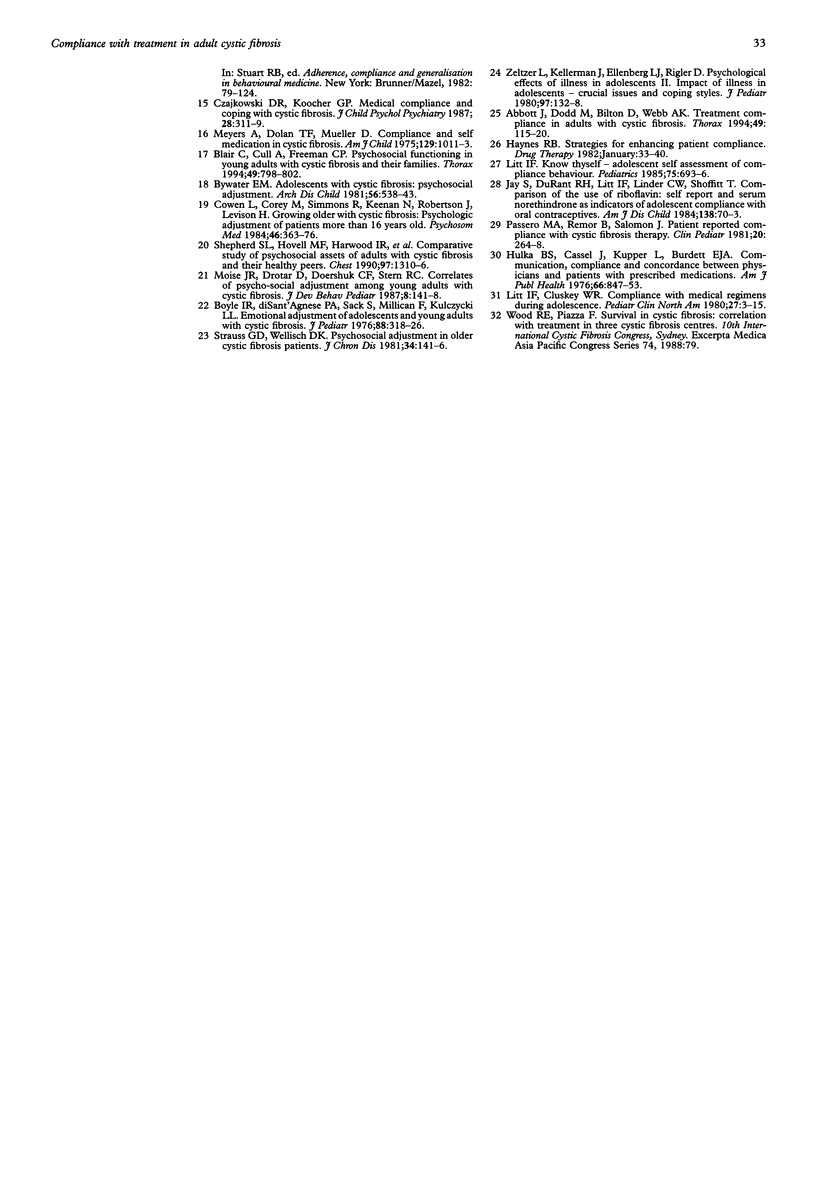
Selected References
These references are in PubMed. This may not be the complete list of references from this article.
- Abbott J., Dodd M., Bilton D., Webb A. K. Treatment compliance in adults with cystic fibrosis. Thorax. 1994 Feb;49(2):115–120. doi: 10.1136/thx.49.2.115. [DOI] [PMC free article] [PubMed] [Google Scholar]
- Blair C., Cull A., Freeman C. P. Psychosocial functioning of young adults with cystic fibrosis and their families. Thorax. 1994 Aug;49(8):798–802. doi: 10.1136/thx.49.8.798. [DOI] [PMC free article] [PubMed] [Google Scholar]
- Boyle I. R., di Sant'Agnese P. A., Sack S., Millican F., Kulczycki L. L. Emotional adjustment of adolescents and young adults with cystic fibrosis. J Pediatr. 1976 Feb;88(2):318–326. doi: 10.1016/s0022-3476(76)81011-6. [DOI] [PubMed] [Google Scholar]
- Bywater E. M. Adolescents with cystic fibrosis: psychosocial adjustment. Arch Dis Child. 1981 Jul;56(7):538–543. doi: 10.1136/adc.56.7.538. [DOI] [PMC free article] [PubMed] [Google Scholar]
- Chrispin A. R., Norman A. P. The systematic evaluation of the chest radiograph in cystic fibrosis. Pediatr Radiol. 1974;2(2):101–105. doi: 10.1007/BF01314939. [DOI] [PubMed] [Google Scholar]
- Cowen L., Corey M., Simmons R., Keenan N., Robertson J., Levison H. Growing older with cystic fibrosis: psychologic adjustment of patients more than 16 years old. Psychosom Med. 1984 Jul-Aug;46(4):363–376. doi: 10.1097/00006842-198407000-00005. [DOI] [PubMed] [Google Scholar]
- Czajkowski D. R., Koocher G. P. Medical compliance and coping with cystic fibrosis. J Child Psychol Psychiatry. 1987 Mar;28(2):311–319. doi: 10.1111/j.1469-7610.1987.tb00213.x. [DOI] [PubMed] [Google Scholar]
- Epstein L. H., Cluss P. A. A behavioral medicine perspective on adherence to long-term medical regimens. J Consult Clin Psychol. 1982 Dec;50(6):950–971. doi: 10.1037//0022-006x.50.6.950. [DOI] [PubMed] [Google Scholar]
- Francis V., Korsch B. M., Morris M. J. Gaps in doctor-patient communication. Patients' response to medical advice. N Engl J Med. 1969 Mar 6;280(10):535–540. doi: 10.1056/NEJM196903062801004. [DOI] [PubMed] [Google Scholar]
- Gudas L. J., Koocher G. P., Wypij D. Perceptions of medical compliance in children and adolescents with cystic fibrosis. J Dev Behav Pediatr. 1991 Aug;12(4):236–242. [PubMed] [Google Scholar]
- Hulka B. S., Cassel J. C., Kupper L. L., Burdette J. A. Communication, compliance, and concordance between physicians and patients with prescribed medications. Am J Public Health. 1976 Sep;66(9):847–853. doi: 10.2105/ajph.66.9.847. [DOI] [PMC free article] [PubMed] [Google Scholar]
- Jay S., Litt I. F., Durant R. H. Compliance with therapeutic regimens. J Adolesc Health Care. 1984 Apr;5(2):124–136. doi: 10.1016/s0197-0070(84)80012-1. [DOI] [PubMed] [Google Scholar]
- Lask B. Non-adherence to treatment in cystic fibrosis. J R Soc Med. 1994;87 (Suppl 21):25–27. [PMC free article] [PubMed] [Google Scholar]
- Litt I. F., Cuskey W. R. Compliance with medical regimens during adolescence. Pediatr Clin North Am. 1980 Feb;27(1):3–15. doi: 10.1016/s0031-3955(16)33815-9. [DOI] [PubMed] [Google Scholar]
- Litt I. F. Know thyself--adolescents' self-assessment of compliance behavior. Pediatrics. 1985 Apr;75(4):693–696. [PubMed] [Google Scholar]
- Meyers A., Dolan T. F., Jr, Mueller D. Compliance and self-medication in cystic fibrosis. Am J Dis Child. 1975 Sep;129(9):1011–1013. doi: 10.1001/archpedi.1975.02120460005002. [DOI] [PubMed] [Google Scholar]
- Moise J. R., Drotar D., Doershuk C. F., Stern R. C. Correlates of psychosocial adjustment among young adults with cystic fibrosis. J Dev Behav Pediatr. 1987 Jun;8(3):141–148. [PubMed] [Google Scholar]
- Passero M. A., Remor B., Salomon J. Patient-reported compliance with cystic fibrosis therapy. Clin Pediatr (Phila) 1981 Apr;20(4):264–268. doi: 10.1177/000992288102000406. [DOI] [PubMed] [Google Scholar]
- SHWACHMAN H., KULCZYCKI L. L. Long-term study of one hundred five patients with cystic fibrosis; studies made over a five- to fourteen-year period. AMA J Dis Child. 1958 Jul;96(1):6–15. doi: 10.1001/archpedi.1958.02060060008002. [DOI] [PubMed] [Google Scholar]
- Shepherd S. L., Hovell M. F., Harwood I. R., Granger L. E., Hofstetter C. R., Molgaard C., Kaplan R. M. A comparative study of the psychosocial assets of adults with cystic fibrosis and their healthy peers. Chest. 1990 Jun;97(6):1310–1316. doi: 10.1378/chest.97.6.1310. [DOI] [PubMed] [Google Scholar]
- Strauss G. D., Wellisch D. K. Psychosocial adaptation in older cystic fibrosis patients. J Chronic Dis. 1981;34(4):141–146. doi: 10.1016/0021-9681(81)90024-2. [DOI] [PubMed] [Google Scholar]
- Suls J., Fletcher B. The relative efficacy of avoidant and nonavoidant coping strategies: a meta-analysis. Health Psychol. 1985;4(3):249–288. doi: 10.1037//0278-6133.4.3.249. [DOI] [PubMed] [Google Scholar]
- Wright E. C. Non-compliance--or how many aunts has Matilda? Lancet. 1993 Oct 9;342(8876):909–913. doi: 10.1016/0140-6736(93)91951-h. [DOI] [PubMed] [Google Scholar]
- Zeltzer L., Kellerman J., Ellenberg L., Dash J., Rigler D. Psychologic effects of illness in adolescence. II. Impact of illness in adolescents--crucial issues and coping styles. J Pediatr. 1980 Jul;97(1):132–138. doi: 10.1016/s0022-3476(80)80153-3. [DOI] [PubMed] [Google Scholar]


